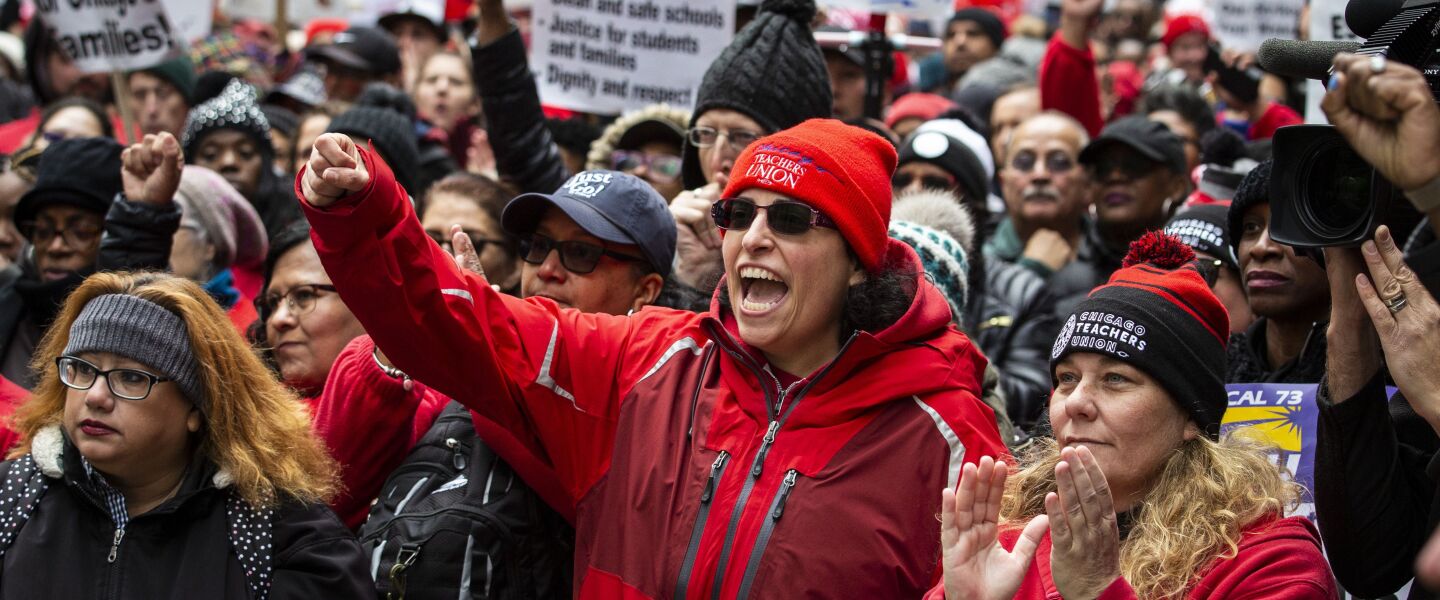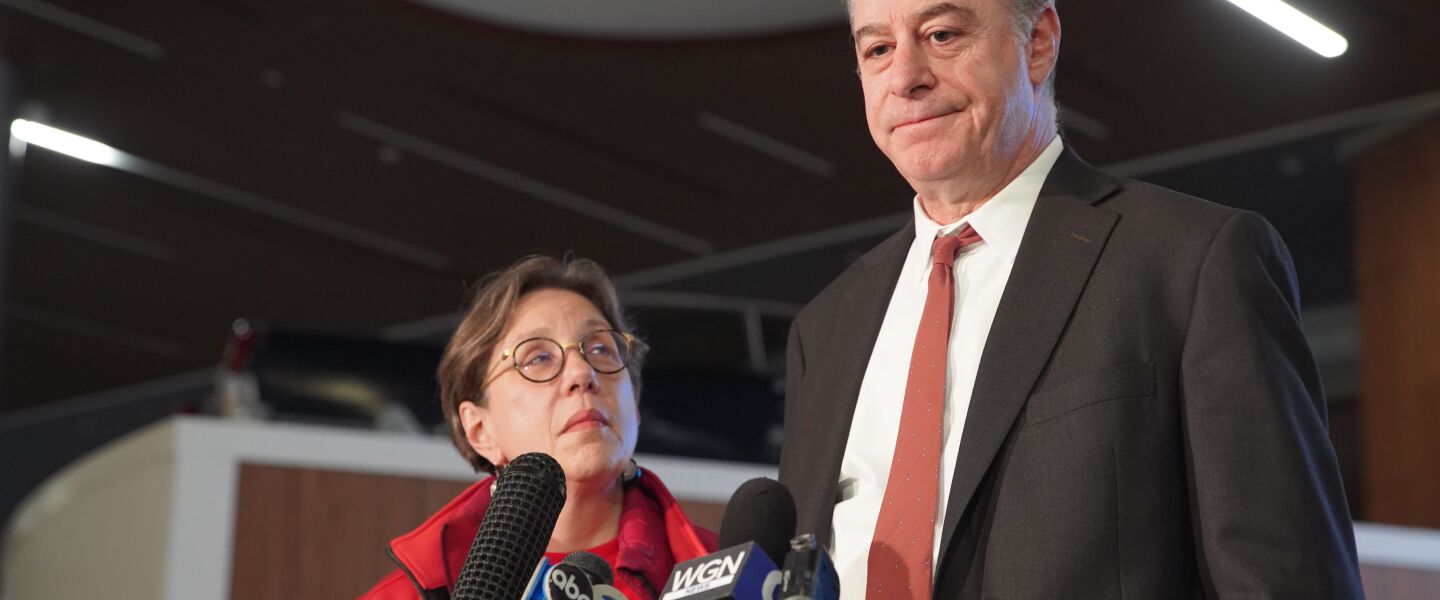It wasn’t about the Chicago Teachers Union’s endorsement of Mayor Lori Lightfoot’s election foe, and it definitely wasn’t about any show of power from either side.
This was just a clean discussion over the future of the city’s public schools system.
So, after all that talk, how did Chicago end up having to endure its longest teachers strike in more than three decades?
How did the ordeal become so bitter that union leaders refused to appear at a news conference with the mayor after the deal was reached? Or that, by the final day of contract negotiations, the union’s big bargaining team wasn’t there and the mayor’s office didn’t have a single representative at the table?
How did it get to the point that the union’s vice president was denied entry into the final meeting that sealed the agreement and sent hundreds of thousands of kids back to school?
It took a perfect storm of strong personalities, unrealistic expectations, rookie mistakes and cracks in the armor on both sides.
Slow buildup
Lightfoot, the relative political newcomer who had never before held elected office, had only just won the mayoral race in April and was inaugurated in May.
Once she got her house in order, the mayor turned her focus to teachers negotiations. There wasn’t too much public attention being paid to that issue in late August, but talks were starting to ramp up ever so slightly with a potential strike still a couple months away.
“This was never designed to be an adversarial situation,” a top mayoral aide said. “We were never interested in making a point.”
Lightfoot thought she could get ahead of the game and possibly find an early solution to a situation that was threatening to become her biggest test yet. Her predecessor, Rahm Emanuel, had faced the city’s first teachers strike in 25 years soon after he took office, and Lightfoot wanted to avoid that at all costs. She didn’t want to make an enemy out of the teachers union like Emanuel had.
“This was never designed to be an adversarial situation,” a top mayoral aide said. “We were never interested in making a point.”
So even after offering a significant pay increase of 14% over five years, the mayor upped her offer to 16%, aligning herself with the recommendation by an independent fact-finder. That raise would be on top of the yearly bumps teachers already get for seniority and continuing education.
“There’s no reason a deal can’t be reached by the start of the school year,” Lightfoot said at the time. “There’s no reason there should be a strike. We have 30 days to get the job done. We could get this done today. We’ve put, I think, a very robust offer on the table.”
That, some observers have said, was one in a series of mistakes that set the course for a prolonged strike.
Lightfoot miscalculated how strongly the union would stick behind the rest of its demands. Even after Lightfoot said she would put the CTU’s requests for more staffing of nurses and social workers into the schools budget, the union kept pushing she “put it in writing” in the contract.
“From her perspective, she’s acting in ways that support her belief that this should be a relatively straightforward and easy process,” said Bob Bruno, a labor professor at the University of Illinois at Urbana-Champaign who has studied CPS-CTU negotiations for years and wrote a book about the 2012 strike.
“The causes and the conditions for the tensions, for the acrimony, really were a product of decisions that were made actually months before,” Bruno said, when Emanuel was still mayor. Going into the negotiations, Lightfoot didn’t anticipate that the negotiations would turn into a war — as they eventually did — in part because, “I’m not Rahm,” she said in September.
‘You have those real hurt feelings’
In the weeks leading up to the strike, little changed in negotiations.
The mayor held strong that she wouldn’t put staffing demands into the contract and that the offer of a significant pay increase should have been enough to avert a walkout.
Bruno said it was “very difficult for the mayor to accept” that the union would strike over issues the city wasn’t legally required to bargain over.
“It was obviously the case that it wasn’t until the strike that she began to really consider and begin to negotiate around these issues,” Bruno said. “And for CTU, it’s tied to their identity, it isn’t easy to give up. They have said repeatedly, we’re talking about learning conditions, we’re talking about equity, we’re talking about mental health and social justice and that’s our identity.”
But once negotiations started and the mayor agreed to bargain over those issues, talks started to go smoothly. There was a sense from both sides that a deal could be reached in a matter of days.
The problem? Too many issues had been left unresolved by the time the strike came along. There was too much to do and too little time to do it. On top of that, both sides at that point were going strong in their efforts to win hearts and minds of parents and taxpayers. So while talks at the table were amenable and productive, the public rhetoric coming from both city officials and union leaders made it harder to focus.
The union and its supporters quickly started firing shots at the mayor. Days before the strike started, American Federation of Teachers President Randi Weingarten ruffled feathers when she said at a rally that “we’re about to teach the new mayor a lesson.” On the picket lines, teachers’ chants and signs directly targeted Lightfoot. “Let them hear you on the fifth floor,” one union leader screamed during the first of multiple rallies outside the mayor’s office in City Hall.

Thousands of striking Chicago Teachers Union and SEIU Local 73 members and their supporters rally at the Thompson Center after marching around City Hall during Mayor Lori Lightfoot’s first budget address during the monthly Chicago City Council meeting, Wednesday morning, Oct. 23, 2019.
Ashlee Rezin Garcia/Sun-Times
By that point, the mayor and her allies might have changed their view of the union, which had supported her rival for mayor but hadn’t really damaged her politically before the strike.
“Instead of just having two parties that have different approaches or have different interests but you can respect their right to hold them, well now maybe you see each other as really dangerous enemies,” Bruno said. “And each day of the strike just helps to confirm that mentality.”
“Instead of just having two parties that have different approaches or have different interests but you can respect their right to hold them, well now maybe you see each other as really dangerous enemies.”
On Monday, Oct. 21, the third day of canceled classes due to the strike, Lightfoot sent a letter to CTU President Jesse Sharkey asking him to end the walkout while negotiations continued. Sharkey and CTU Vice President Stacy Davis Gates responded to what was a fairly mildly worded and transparent effort to win public support by saying the letter “dashed” their hopes for a quick resolution, and negotiations stalled.
“You have those real hurt feelings,” Bruno said. “And the parties use rhetoric at times that can get away from them. And you have to make some allowances for the things that are said in public, but those things can bite, you can leave a mark. You can feel like the battle’s being personalized.”
Progress before ‘breach of trust’
By the end of that second week of the strike, talks had refocused and both sides toned down their attacks heading into the weekend in an effort not to upset progress at the table. The union stopped giving substantive answers to reporters’ questions and city and CPS officials didn’t take any questions. Over the span of a couple days, Lightfoot barely made any public remarks.
“You know, we’re consciously trying to do our talking at the bargaining table and not just be out here throwing elbows,” Sharkey said that Friday.
But over the weekend, negotiations appeared to stall yet again. Friday night, a confidential document was leaked that showed the two sides remained at least $71 million apart. CPS officials started talks the next day saying there had been a “breach of trust” that needed to be addressed at the table.
Then a visibly angry Lightfoot came out at a rare Sunday night news conference with her strongest statement yet against the CTU.
“We are enormously disappointed that CTU cannot simply take yes for an answer,” Lightfoot told reporters at City Hall the night of Oct. 27.
The cause of the impasse wasn’t as publicly clear that time. But inside Malcolm X College, where the two sides were meeting since the start of the walkout, there was a sense from the union’s side of the table that there wasn’t total agreement between CPS officials and representatives from the mayor’s office. Mayoral aides have denied that narrative.
Still, that idea started creeping into the heads of union officials as they found themselves in agreement with the educators representing CPS management while not getting along with the officials from the mayor’s office.
Deal, then no deal
As cooler heads prevailed, the two sides went back to the table for a 16-hour marathon session the next day.
Shortly after 11 p.m. Monday night, the union issued a statement saying “the CTU bargaining team remains at the table and does not plan on leaving until they’ve managed to get a tentative agreement with CPS.”
Yet a few hours later, the two sides walked out of Malcolm X without a deal. And Sharkey and Davis Gates went out the building’s side entrance without addressing reporters in the lobby.
From their perspective, they were so close that they wanted to avoid even putting their faces on television so as not to derail talks with the mayor.
But for the city, it was the introduction of two new issues — two bills in Springfield that the CTU wanted Lightfoot to support — that set things back.
The last-minute demands grew the rift between union leadership and specifically the mayor’s office, which felt the CTU kept “moving the goalposts” in bargaining by trying to force the mayor to back it’s legislative agenda — something Lightfoot rejected out of hand.
That, in part, led to the negotiations being whittled down by Wednesday to only the CTU’s top officials and their attorney, and the city’s lead negotiator with CPS officials. Neither of the two representatives from the mayor’s office who were mainstays at bargaining went to Malcolm X that day.
Later that afternoon, Sharkey and his team went to City Hall for a three-hour meeting with Lightfoot that appeared to mend some differences as the mayor added $15 million to her offer.
At that point, CTU leaders called in their House of Delegates for an informational meeting to update the governing body on the status of negotiations. The meeting was never presented as one that could include a potential strike-ending vote, but that’s how it was billed by the mayor and CPS, who said they would wait until after the meeting to make a decision about the next day’s classes.
That misrepresentation angered members, who by then had become so bitter at the mayor that some were willing to continue striking just based off the perceived slights by the city.
‘Go take the safe’
The next day, negotiations had reached make or break time. Kids were missing their 10th day of school that day and patience was wearing thin among families and taxpayers.
As hard as they had fought and as dissatisfied as they were with some aspects of their agreement, Sharkey and Davis Gates recognized it was time to wrap up talks and head home with what they’d gotten.
At that point, they had won serious change for the city’s teachers, schools and children. They didn’t get the three-year deal they wanted or the teacher preparation time they were looking for, but they achieved big raises for teachers, minimal health care increases, $35 million to address overcrowded classes and guarantees for hundreds of new positions.
Sharkey told the union’s elected delegates who he had called in for a meeting for the second straight night that they needed to decide “when is a win a win.”
But by that point, their weeks of tough talk might have built up hopes too high.
As much as Sharkey and Davis Gates’ jobs were to negotiate on behalf of their members, they also had to rile them up to sustain support for the walkout. By the end, they were having to talk members down off their high expectations.
So when Sharkey was telling a room full of 700 elected delegates that there was nothing left to negotiate, that didn’t go over too well. Some members walked out angry at the deal they were given and upset with Lightfoot, calling her a “failed mayor.”
In one exchange tweeted from inside the meeting by bargaining team member Alison Eichhorn, there seemed to be some push-back on Sharkey.
“Jesse said that he thinks we got all that we could get. He said we took the tableware, we took the floorboards. Member gets up and says, ‘Well, this isn’t one billion dollars so you need to go take the safe.’”
Battle over makeup days — and pay
That contentious delegates meeting ended up with an unusually close vote to approve a tentative agreement with CPS, a decision that should have effectively suspended the union’s strike.
But the union said it still wouldn’t end its strike until the issue of makeup days was resolved, and Lightfoot wasn’t having it.
“At this late hour we are not adding any new issues,” the mayor told reporters at City Hall. “I’m not compensating them for days they were out on strike. ... I’m not going to negotiate.
Despite it being common practice that education workers receive makeup pay after strikes — and union officials saying from the start that it was something they cared about — the mayor’s defiant stance on the issue was the strongest she had come out against the union the whole strike. The mayor’s office felt as though the city’s negotiators had gone a long way to meet the CTU’s demands, even acknowledging that the union had achieved a lot of what it asked for.
But it was the way union leaders went about the final push for makeup days that rubbed the mayor the wrong way. Lightfoot’s office said the topic was never broached in face-to-face meetings, and she was never given an opportunity to compromise before the House of Delegates vote.
That’s why Lightfoot went on the attack 14 days into the strike and after the 11th day of school was officially canceled. That final showdown let Lightfoot show her “prosecutor side,” a mayoral aide said.
“This was never part of the plan, but over [those] 48 hours she had the opportunity to show the entire city and state that she demands respect,” the aide said after the strike ended. “Internally the lessons are not as important as that other people should learn about how to deal with this mayor.”
“This is a big paradigm shift. This is a kind of resetting of the power relationship. ... So I think it was always potentially fraught with tension and acrimony.”
In the eyes of even some Lightfoot supporters, the union had to that point won negotiations in a landslide. But continuing to play a public game over the final push for makeup days opened the door for Lightfoot to recover a win of her own.
Davis Gates was shut out of the last meeting Thursday that saw the two sides agree on the final sticking point and suspend the strike. Sharkey and the CTU’s lead negotiator, Robert Bloch, went ahead with the meeting, but afterward they declined to appear at a joint news conference with the mayor outside her fifth floor office.
They instead spoke on the first floor with Davis Gates, who was angry at Lightfoot for only giving back five of the 11 lost days, which is fewer than typical.
Despite the lingering hostility between the mayor and Davis Gates — who some onlookers believe could be headed for a mayoral run in a few years — the union ended the tense ordeal with a clear victory on issues that were central to the mayor’s campaign.
“This is a big paradigm shift,” Bruno said. “This is a kind of resetting of the power relationship. For the mayor to [eventually bargain over those issues] or embrace that ultimately I think was risky for her.











